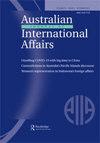Assessing the maritime ‘rules-based order’ in Antarctica
IF 1.8
3区 社会学
Q2 INTERNATIONAL RELATIONS
引用次数: 0
Abstract
ABSTRACT International Relations has become increasingly interested in maritime order as the oceans have emerged as a key site of strategic competition. The South China Sea has become totemic of contests between ‘free’ and ‘closed’ visions of the seas, and is viewed by some as a litmus test for China’s efforts to re-write the ‘rules-based order’ in other maritime domains. This article examines the maritime ‘rules-based order’ in Antarctica, critically examining how and why the United Nations Convention on the Law of the Sea (UNCLOS) matters for the Antarctic region, the Southern Ocean and mechanisms of regional governance. This article contributes to understanding the complexity of maritime order in Antarctica by using Australia’s maritime claims as a case study. Australia is the largest claimant state in Antarctica, with the Australian Antarctic Territory (AAT) constituting 42% of the landmass. This paper examines Australia’s contentious maritime jurisdiction and its ‘normative hedging’ strategy that simultaneously asserts maritime claims and defends collective governance mechanisms, despite the apparent dissonance between these two positions. It argues that the Antarctic region has its own unique ‘rules-based order’ and geographic realities that complicate cross-regional comparisons, and that even so-called ‘like-minded’ states interpret maritime rules in different ways.评估南极洲的海上“基于规则的秩序”
随着海洋成为战略竞争的重要场所,国际关系对海洋秩序越来越感兴趣。南中国海已成为“自由”和“封闭”海洋概念之争的象征,一些人将其视为中国在其他海洋领域改写“基于规则的秩序”努力的试金石。本文考察了南极洲的海洋“基于规则的秩序”,批判性地考察了《联合国海洋法公约》(UNCLOS)对南极地区、南大洋和区域治理机制的重要性。本文以澳大利亚的海洋权利主张为例,有助于理解南极洲海洋秩序的复杂性。澳大利亚是南极洲最大的主权声索国,澳大利亚南极领地(AAT)占南极洲陆地面积的42%。本文考察了澳大利亚有争议的海事管辖权及其“规范性对冲”策略,该策略同时主张海事索赔并捍卫集体治理机制,尽管这两个立场之间存在明显的不协调。它认为,南极地区有自己独特的“基于规则的秩序”和地理现实,这使得跨区域比较变得复杂,甚至所谓的“志同道合”的国家也以不同的方式解释海洋规则。
本文章由计算机程序翻译,如有差异,请以英文原文为准。
求助全文
约1分钟内获得全文
求助全文
来源期刊

Australian Journal of International Affairs
INTERNATIONAL RELATIONS-
CiteScore
3.20
自引率
13.30%
发文量
44
期刊介绍:
AJIA is the journal of the Australian Institute of International Affairs. The Institute was established in 1933 as an independent and non-political body and its purpose is to stimulate interest in and understanding of international affairs among its members and the general public. The aim of the Australian Journal of International Affairs is to publish high quality scholarly research on international political, social, economic and legal issues, especially (but not exclusively) within the Asia-Pacific region. The journal publishes research articles, refereed review essays and commentary and provocation pieces. ''Articles'' are traditional scholarly articles. ‘Review essays’ use newly published books as the basis to thematically examine current events in International Relations. The journal also publishes commentaries and provocations which are high quality and engaging pieces of commentary, opinion and provocation in a variety of styles. The Australian Journal of International Affairs aims to analyse international issues for an Australian readership and to present Australian perspectives to readers in other countries. While seeking to stimulate interest in and understanding of international affairs, the journal does not seek to promote any particular policies or approaches. All suitable manuscripts submitted are sent to two referees in a full ''double blind'' refereeing process.
 求助内容:
求助内容: 应助结果提醒方式:
应助结果提醒方式:


